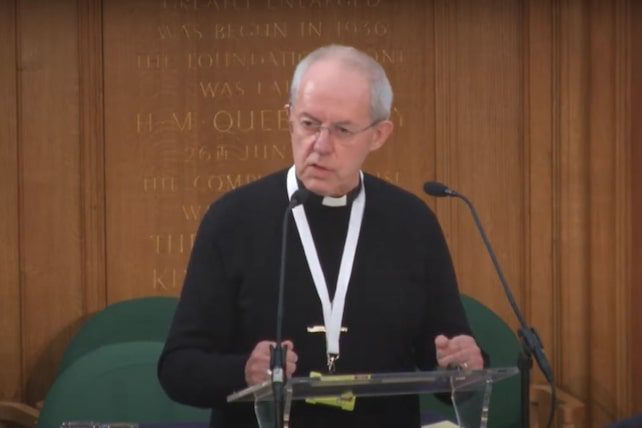A bishop with the Church of England has indicated the church is exploring the possibility of moving away from the pronouns “he” and “him” when referring to God in favor of more “inclusive language.” The news comes from an exchange between church leaders during the Church of England’s General Synod, which is meeting in London this week from Feb. 6 to Feb. 9.
“Please,” said Rev. Joanna Stobart of the Diocese of Bath and Wells in a written question, “could the Liturgical Commission provide an update on the steps being taken to develop more inclusive language in our authorized liturgy and to provide more options for those who wish to use authorized liturgy and speak of God in a non-gendered way particularly in authorized absolutions where many of the prayers offered for use refer to God using male pronouns?”
The Rt. Rev. Michael Ipgrave, Bishop of Lichfield and vice-chairman of the Church of England’s Liturgical Commission, responded that the Liturgical Commission has been working with the Faith and Order Commission to explore “the use of gendered language in relation to God for several years.” Ipgrave said, “After some dialogue between the two commissions in this area, a new joint project on gendered language will begin this spring.”
Church of England’s General Synod Meets in London
The General Synod, a national meeting of the Church of England, “considers and approves legislation affecting the whole of the Church of England, formulates new forms of worship, debates matters of national and international importance, and approves the annual budget for the work of the Church at national level.” A controversial issue that the Synod is considering this week is whether or not to the bless the civil unions of gay couples, despite continuing to refuse to bless gay marriages.
The Liturgical Commission of the Church of England oversees the use of liturgy in the church, while the Faith and Order Commission advises the church on theology. The news about the gender-inclusivity project has some people speculating about whether the church will change the pronouns in the Lord’s prayer, which begins, “Our Father.”
Ipgrave noted in his response to Stobart that making such a change to the church’s liturgy would be an involved undertaking. “Changing the wording and number of authorized forms of absolution would require a full Synodical process for approval,” he said.
A spokesperson for the Church of England sent ChurchLeaders the following statement:
Christians have recognised since ancient times that God is neither male nor female. Yet the variety of ways of addressing and describing God found in Scripture has not always been reflected in our worship. There has been greater interest in exploring new language since the introduction of our current forms of service in contemporary language more than 20 years ago. The Liturgical Commission – the body which prepares forms of service for the Church of England – has been regularly considering these questions since 2014. As part of its regular programme of work for the next five years, the Commission has asked another Church of England body, the Faith and Order Commission – which advises on theology – to work with it on looking at these questions. There are absolutely no plans to abolish or substantially revise currently authorized liturgies and no such changes could be made without extensive legislation.
Nevertheless, some have hailed the news arising from the exchange between Stobart and Ipgrave as a positive step. Women and the Church (WATCH), a group that works toward gender equity in the Church of England, praised the opportunity for liturgy to have more inclusive wording, as did Professor Helen King, the vice-chairman of the Synod’s gender and sexuality group.

